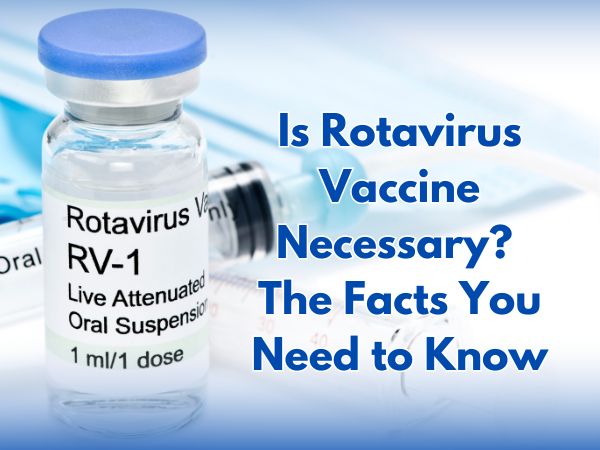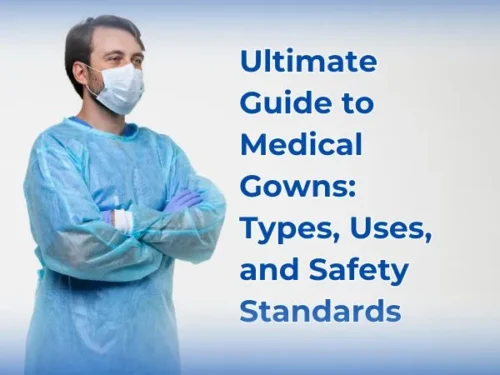Rotavirus is one of the leading causes of diarrheal deaths around the world. As per the Centers for Disease Control and Prevention (CDC), every year, nearly 500,000 people die due to rotavirus-related gastroenteritis. In the US, approximately 2.7 million rotavirus infections are reported per annum with 95% of children who get infected before the age of 5. Considering these statistics, the disease is putting too much pressure on the healthcare sector and economy. Keeping this in mind, the answer to the question is rotavirus vaccine necessary is yes.

Rotavirus vaccinations are administered orally in divided doses
In this article, let us further explore the available rotavirus vaccines to address the question is rotavirus vaccine necessary more thoroughly.
What is Rotavirus?
Rotavirus is a highly contagious double-stranded RNA viral entity that is known to cause moderate or severe diarrhea and vomiting. The virus enters the body via the oral route and affects the gastrointestinal tract which gets swollen and irritated. Once the virus has entered the body, it spends an initial incubation period of three to eight days before causing the infection.
Subjects most affected by the infection are infants and children under the age of 5. Due to severe diarrhea, dehydration happens which itself can become life-threatening.
Symptoms of Rotavirus Infection
While focusing on answering the question of is rotavirus vaccine necessary, there is also a need for diagnosing the condition properly as you or your child may already have it. Here are some of the symptoms associated with moderate to severe rotavirus disease which should not be taken lightly and treatment should be started immediately:
- Dry mouth and throat
- Dizziness upon standing up
- Extreme tiredness
- Increased urge to sleep
- Decreased urine output
- Not making tears while crying

Diarrhea and dehydration associated with rotavirus disease can become life-threatening
Is There a Vaccine for Rotavirus Disease?
Yes, two rotavirus vaccines are available in many parts of the world where the disease takes many lives each year. While learning is rotavirus vaccine necessary, it should be kept in mind that both rotavirus vaccines have been approved in the US and are detailed as follows:
RotaTeq (RV5)
RotaTeq is an FDA-approved live vaccine for the prevention of rotavirus disease. It is an oral vaccine which is administered in children in 3 doses.
- The first dose of RotaTeq is administered with the baby is between 6 to 12 weeks of age.
- The second dose is given 4 to 10 weeks after the first dose.
- As for the third or the last dose, doctors wait until the child reaches the age of 32 weeks.
Possible Side Effects of RotaTeq
Although rotavirus vaccines are generally considered safe, some children might experience some of the side effects which include:
- Diarrhea
- Vomiting
- Runny nose
- Sore throat
- Wheezing
- Coughing
- Ear infection
- Fever
- Appearance of hives on the skin
In addition to the above-mentioned side effects, it should be considered that the risk of Kawasaki disease is also present while learning is rotavirus vaccine necessary. It is a serious condition which can affect the heart and can become life-threatening. Its symptoms include the following:
- Fever
- Rash
- Red mouth
- Red eyes
- Swollen glands
- Swelling of the hands and feet
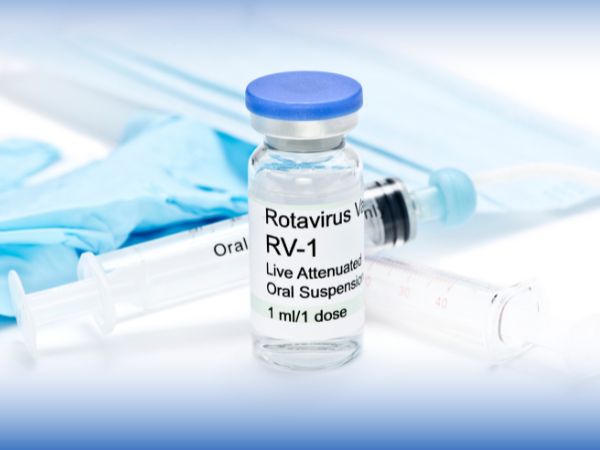
Rotavirus vaccines are live vaccines and are to be given via oral route
Rotarix (RV1)
Rotarix is another FDA-approved oral rotavirus vaccine that can be given to infants and children for the prevention of rotavirus infection. While learning is rotavirus vaccine necessary, it should be kept in mind that rotarix can effectively prevent infections caused by G1 as well as non-G1 (i.e. G3, G4, and G9) viruses. The vaccine is suitable for infants at the age of 6 weeks and can be administered up to 24 weeks of age.
Rotarix vaccine is administered in two doses:
- The first dose is given at 2 months of age
- The second dose is administered at when the baby is 4 months old.
Possible Side Effects of Rotarix
While learning is rotavirus vaccine necessary, it is essential to look into the possible side effects of each vaccine. The following section covers some of the side effects that can be experienced after the administration of rotarix vaccine:
- Diarrhea
- Pain in the ears
- Fever
- Headache
- Muscle pain
- Irritability
- Sore throat
- Nausea
- Vomiting
- Stuffy or runny nose
- Extreme tiredness
- Pain in the stomach
- Cramping in the abdomen
In case of some of the following rare but severe symptoms, it is advised to contact your healthcare provider immediately while learning is rotavirus vaccine necessary:
- Chest tightness
- Sunken eyes
- Wrinkled skin
- Fainting
- Increased heart rate
- Rapid breathing
- Seizures

All the children below the age of 5 should be given rotavirus vaccines
Is Rotavirus Vaccine Necessary?
Yes. Children who have received rotavirus vaccine are far less vulnerable to rotavirus infection. As per the CDC, children who receive the RotaTeq vaccine gain up to 98% protection against the severe form of rotavirus-associated gastroenteritis while 74% get protected against gastroenteritis of any severity level.
The CDC also reports 94% fewer emergency visits as well as 96% fewer hospitalizations among children who have completed their rotavirus vaccination.
As for the Rotarix, the vaccine has been found to be 96% effective in reducing hospitalizations in addition to providing 85 to 96% protection against severe rotavirus gastroenteritis.
Over the years, several studies have been conducted to evaluate if the rotavirus vaccination is actually as effective as claimed. The findings of these studies have been affirmative and thus indicate that the vaccines are indeed effective in preventing the disease, especially in low-income countries with high infant mortality rates.
Who is at a Higher Risk of Getting Severe Rotavirus Disease?
Although rotavirus infection can happen to anyone, some people are simply at a higher risk than others. Therefore, while learning is rotavirus vaccine necessary, it is also essential to focus on the high-risk group that needs vaccination on a priority basis. This high-risk group includes the following:
- Children between the ages of 3 months to 3 years
- Adults who have children
- Staff at daycare facilities
- Elderly people
- People with a weak immune system due to cancer, HIV, or any other disease state
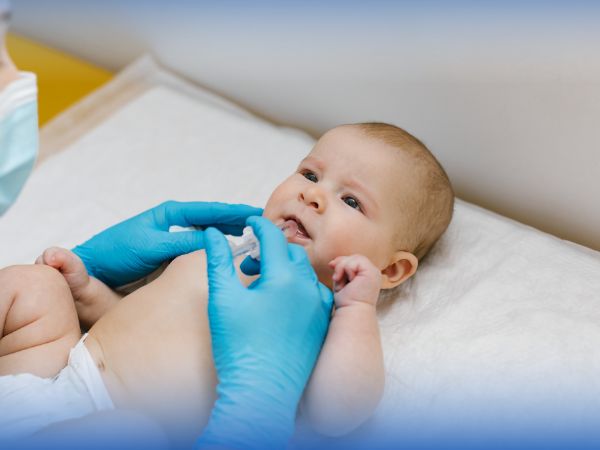
Rotavirus vaccines are safe and FDA-approved
Contraindications of Rotavirus Vaccine
While learning is rotavirus vaccine necessary, it is also essential to remember to whom it can and cannot be administered. Children or adults who have the following issues must not be administered with rotavirus vaccination:
- People who have severe allergies to a previous dose of rotavirus vaccine should not be administered with another dose.
- People who are allergic to any component of the rotavirus vaccine should avoid taking the dose.
- With the RV1 rotavirus vaccine, an oral applicator containing rubber latex is employed. Some infants might have an allergy to latex and therefore should not receive the RV1 rotavirus vaccine. Experts recommend administering RV5 instead.
- Children with issues like severe combined immunodeficiency (SCID) are not suitable candidates for rotavirus vaccination.
- While learning is rotavirus vaccine necessary, it is necessary to remember that people with a history of intussusception (i.e. rare disorder involving the sliding of intestinal parts) should not receive the rotavirus vaccine.
Precautionary Measures for Rotavirus Vaccination
While answering the question of is rotavirus vaccine necessary, it is important to address the precautionary measures that need to be taken before giving the vaccine:
- If the person already has a moderate to severe form of acute gastroenteritis, delay the vaccination until recovery.
- People with an altered immunocompetency caused due to any disease condition should be administered the rotavirus vaccine with care.
- The rotavirus vaccine should be administered with care in children with chronic gastrointestinal disease as the safety data is limited.
Frequently Asked Questions
The following section covers some of the frequently asked questions about the rotavirus vaccines while learning is rotavirus vaccine necessary:
1. Is rotavirus vaccine live or killed?
Both RotaTeq and Rotarix vaccines are live vaccines but are safe. These are made by weakening the disease-causing viruses to the point that they remain alive but are not able to make you sick. These viruses are then made into a solution which is administered via oral route.
2. What is the maximum age for a rotavirus vaccination?
If we look at the package inserts, the maximum age for the administration of RotaTeq is 32 weeks while for Rotarix is 24 weeks.
3. How is the vaccine for rotavirus administered?
Both RotaTeq and Rotarix are two of the vaccines available for rotavirus prevention. While understanding is rotavirus vaccine necessary, it should be kept in mind that both of these are oral products that are to be administered in the form of drops using an applicator.
4. What are the risks associated with rotavirus vaccines?
Both the available rotavirus vaccines are generally considered safe for children as well as for adults. The vaccine must be administered within the first 14 weeks after birth. However, if the first dose is given after 14 weeks and 6 days, there is an increased risk of intussusception.
While learning is rotavirus vaccine necessary, it is important to know that if the first dose has not been given before 15 weeks, more doses of the rotavirus vaccine cannot be administered to the baby.
5. Are there any side effects of the rotavirus vaccine?
Yes, some children might experience certain side effects after receiving a dose of rotavirus vaccine. These can include issues like vomiting, severe diarrhea, as well as high fever. In such cases, it is best to contact your healthcare provider for further guidance.
6. What precautions should be taken after rotavirus vaccination?
Once the babies get vaccinated, there is a chance that for the next few days, your baby’s stool will contain small concentrations of weakened rotaviruses. Although these are not supposed to cause any illness, it is still best to wash your hands after changing the diaper.
7. How long does the rotavirus vaccine protect the baby?
While learning is rotavirus vaccine necessary, parents often ask for how long their baby will remain protected. After a single course of vaccination, it has been found that the children remain protected from infection for two rotavirus seasons i.e. from December to June.
8. Can I breastfeed my baby after the rotavirus vaccination?
Yes, you can. There is no risk of breastfeeding a baby who has just received a rotavirus vaccination. Studies have found no risk in doing so.
9. What if my baby spits up the rotavirus vaccination?
If the baby spits up the dose of rotavirus vaccine, there is no need to administer the dose again. This is because the effects of a replacement dose have not been studied in clinical trials. However, the next doses should be administered on time.
10. What if my baby does not develop a fever after vaccination?
Developing a fever after getting a dose of the rotavirus vaccine indicates that the vaccine is working and the body is responding to it. However, while learning is rotavirus vaccine necessary, it is important to know that if the baby does not develop a fever, it does not mean that the vaccine has failed. The baby will still develop immunity.
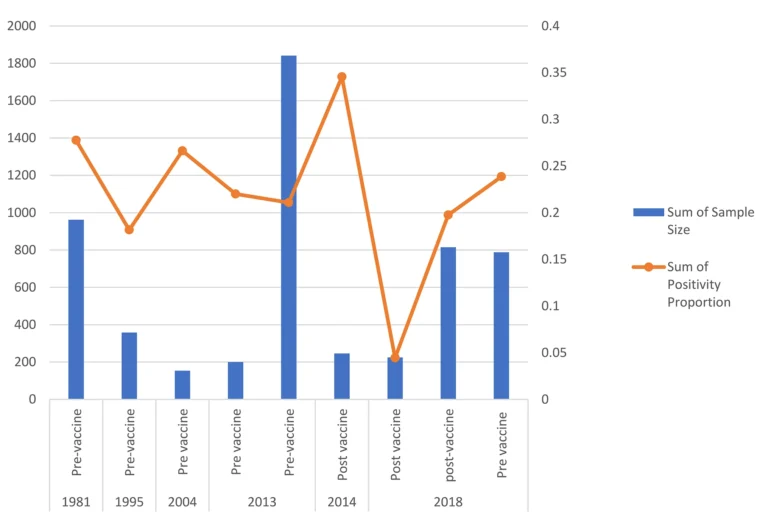
The effectiveness of rotavirus vaccine has been well-established for preventing infection
Source:BMC Infectious Diseases
The products mentioned in this article, along with many other medical supplies, can be purchased from Health Supply 770, a reliable name when it comes to medical products. They have a 30-day money-back guarantee and provide your products to you in the shortest possible time. Click the link at the end of the article to check the wide range of medical products.
Conclusion
Rotavirus is a microbe that causes gastroenteritis, especially in children. The disease results in swelling and irritation of the gastric and intestinal walls which results in nausea, vomiting, and diarrhea. If worsened, this severe rotavirus diarrhea, in addition to dehydration, can become life-threatening.
Therefore, the answer to the question ‘Is rotavirus vaccine necessary?’ is yes. Vaccinated children who have been administered with rotavirus vaccine are less prone to getting infected as compared to those without vaccine administration. Therefore, the importance of rotavirus vaccination is undeniable.
For purchasing top-quality medical goods from different brands for the management of rotavirus infection, reliable vendors like Health Supply 770 should be approached. They ensure the provision of quality products along with satisfactory services.
Click To Buy from Health Supply 770
30649 CLOROX BROAD SPECTRUM QUATERNARY 32OZ, CS9
MCKESSON MEDSURG 50-66160 WIPE, GERMICIDE LG 6″X6.75″ (160/BX 12BX/CS)
Diversey® Oxivir® TB Wipes (5388471) CS
References
https://www.cdc.gov/pinkbook/hcp/table-of-contents/chapter-19-rotavirus.html
https://www.cdc.gov/vaccines/vpd/rotavirus/hcp/about-vaccine.html
https://www.thelancet.com/journals/langlo/article/PIIS2214-109X(20)30262-X/fulltext
https://www.thelancet.com/journals/langlo/article/PIIS2214-109X(24)00237-7/fulltext

PhD Scholar (Pharmaceutics), MPhil (Pharmaceutics), Pharm D, B. Sc.
Uzma Zafar is a dedicated and highly motivated pharmaceutical professional currently pursuing her PhD in Pharmaceutics at the Punjab University College of Pharmacy, University of the Punjab. With a comprehensive academic and research background, Uzma has consistently excelled in her studies, securing first division throughout her educational journey.
Uzma’s passion for the pharmaceutical field is evident from her active engagement during her Doctor of Pharmacy (Pharm.D) program, where she not only mastered industrial techniques and clinical case studies but also delved into marketing strategies and management skills.










